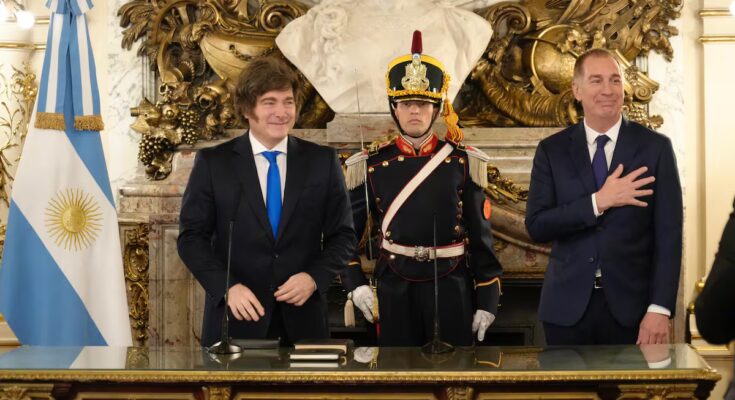Diego Santilli entered politics with the neoliberal Peronist Carlos Menem, was the right-hand man of the Macrist Horacio Rodríguez Larreta and has been, since Tuesday, Interior Minister of the far right Javier Milei. The veteran politician, 58 years old, took the oath at the Casa Rosada with the great challenge of rebuilding the dialogue with the provincial governors who are most supportive of the Government. Their support is fundamental in negotiating the legislative majorities that will allow the approval of the 2026 budget law and the labor, fiscal and criminal reforms promoted by Milei.
Santilli uploaded the inauguration ceremony to his networks. In line with the official discourse, which considers previous governments as a symbol of failure, the minister expressed the desire to work as a team “to implement the reforms that millions of Argentines voted for in October, to put an end to many years of decadence”.
The leader was at the top of the official list of the Chamber of Deputies of the province of Buenos Aires, the most populous in Argentina, in the legislative elections of 26 October. He won 3.6 million votes, 41% of the total, in an unexpected victory against Peronism in his great electoral bastion. Santilli was supposed to take office in the Chamber on December 10, but Milei offered him the Interior portfolio after Lisandro Catalán’s resignation.
Santilli’s meetings with provincial leaders began last Friday and continue this week in a climate of optimism at the Casa Rosada. Unlike what happened in the first half of his mandate, when Milei suffered tough legislative setbacks, starting from December the ruling party will have a third of its deputies with which to support the presidential veto on any law proposed by the opposition.
The president is confident he will garner enough votes to push through next year’s budget, which would be the first approved during his administration. Since he took office at the end of 2023, he has governed by extending the previous Government’s allocation of resources and making changes via decree. So he applied the chainsaw to public spending.
The new Interior Secretary negotiates concessions to governors in exchange for support from responding lawmakers. The provincial leaders ask, among others, the automatic distribution of the revenues that the State withholds from the districts to grant discretionally in case of emergency (and which in practice has become an instrument of pressure) and the sending of corresponding funds to the provincial pension systems.
Santilli also listened to particular requests from some regions, such as that of eliminating taxes on hydrocarbon exports put forward by Macrista Ignacio Torres, governor of Patagonian Chubut; or that of giving greater guarantees to mining companies, formulated by the Peronist dissident Marcelo Orrego, from northern San Juan.
The only governors excluded from talks with the national government are the Peronists who represent the harshest opposition to Milei, led by Buenos Aires native Axel Kicillof. Milei hopes to split the Peronist bloc to more easily achieve legislative victories.
Changes in government
Santilli takes on an essential ministry amid the government reorganization. In addition to the departure of Catalán and Guillermo Francos – replaced as head of cabinet by former president Manuel Adorni – Milei still has to choose who will succeed Luis Petri in Defense and Patricia Bullrich in Security: in a month the former will occupy a seat in the Chamber of Deputies and the latter will be a senator. The Minister of Justice, Mariano Cúneo Libarona, is on a razor’s edge and I don’t know how long they will keep him in office.
The new Interior Minister receives a private portfolio of immigration policy, which on Tuesday moved into the orbit of Security, in line with the government’s priority of strengthening borders and tightening immigration controls. For now, Milei misses the anti-immigration speech of other far-right world leaders, such as the American Donald Trump, but has imposed greater restrictions on foreigners by decree. From the beginning he encouraged provinces to tax foreigners who are treated in public hospitals and in May he tightened the requirements for obtaining Argentine residency and citizenship.



